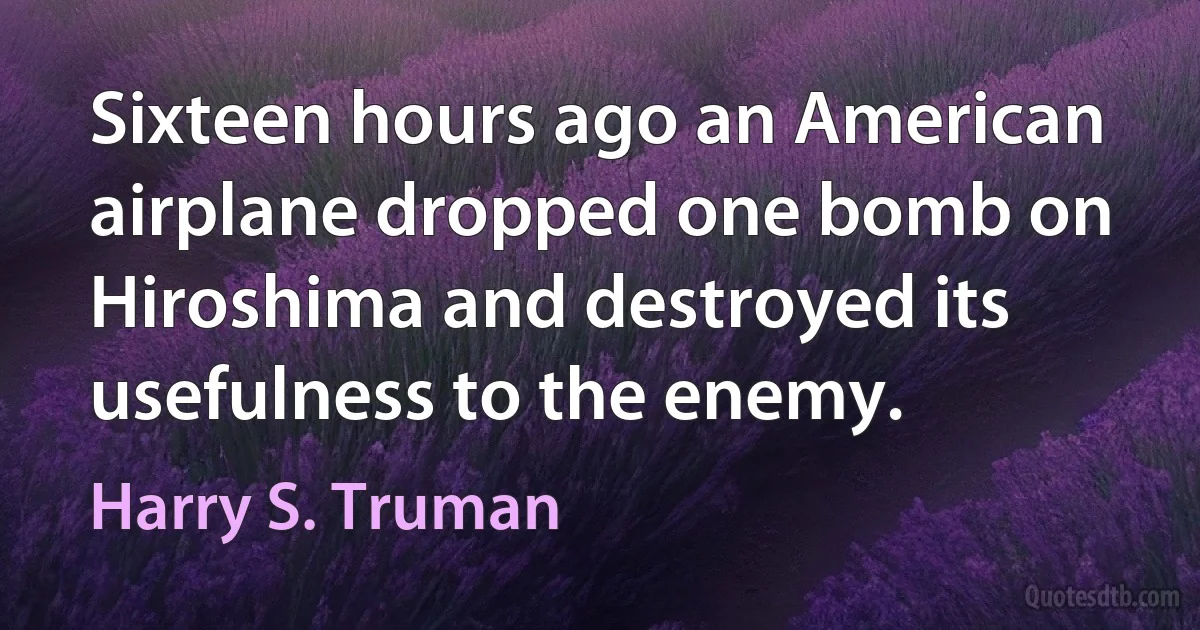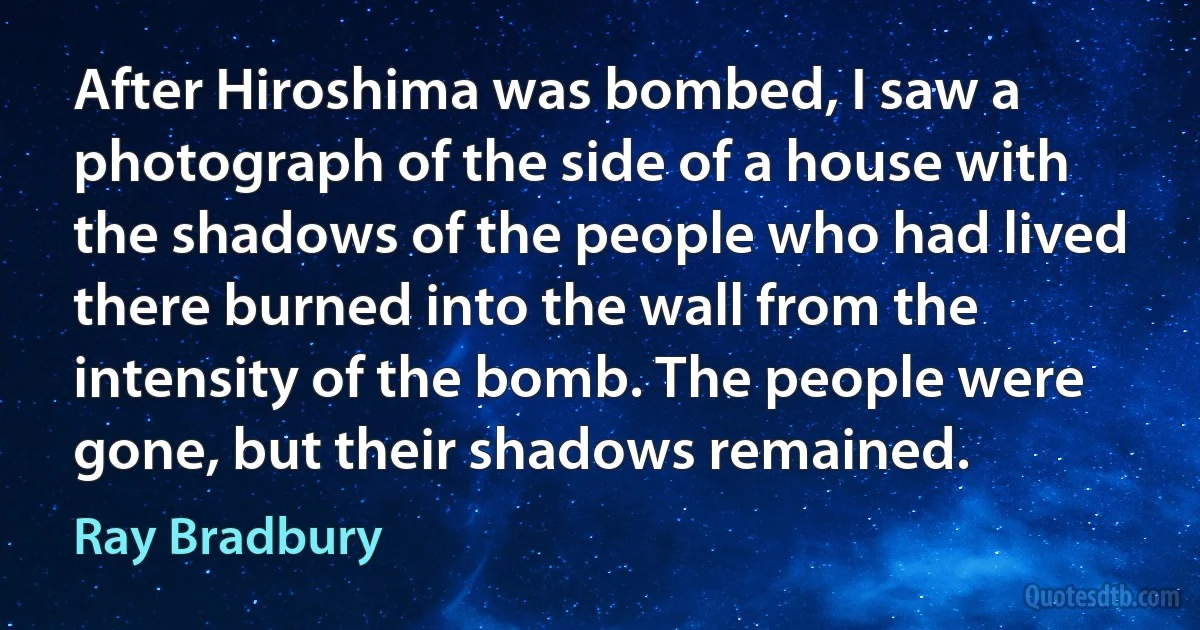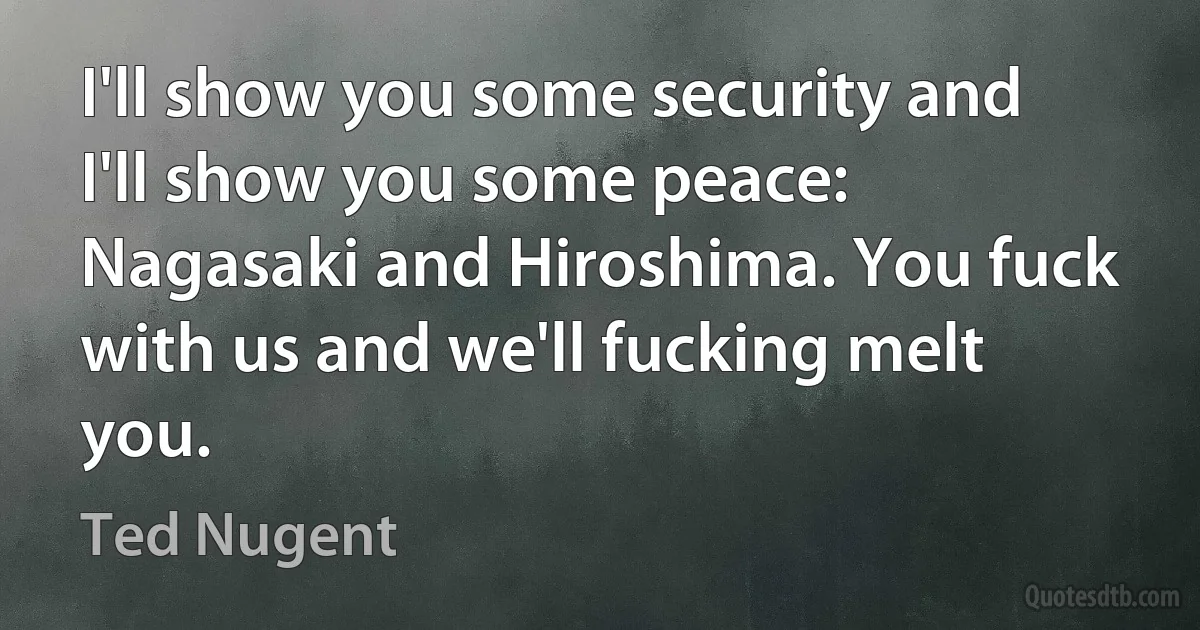Hiroshima Quotes - page 3
I was profoundly moved to be the first United Nations Secretary-General to attend the Peace Memorial Ceremony in Hiroshima. I also visited Nagasaki. Sadly, we know the terrible humanitarian consequences from the use of even one weapon. As long as such weapons exist, so, too, will the risks of use and proliferation.

Ban Ki-moon
The Hiroshima people's experience, is a picture of what our whole world is always poised to become, a backdrop of scarcely imaginable horror lying just behind the surface of our normal life, and capable of breaking through into that normal life at any second.”-The New Yorker, February 1, 1982.

Jonathan Schell
The bell of Hiroshima rings in our hearts not as a funeral knell, but as an alarm bell calling out to actions to protect life on our planet.
We were among the first to demolish the nuclear illusions that existed and to unveil the true face of nuclear weapons - the weapons of genocide.

Yevgeniy Chazov
On Al Gore: "The Eco-Messiah sternly talks up the old Nazi comparisons: "what we're facing is an ecological Holocaust, and the evidence of an ecological Kristallnacht is as clear as the sound of glass shattering in Berlin." That 221,000 kilowatt-hours might suggest that, if this is the ecological Holocaust, Gore's pad is Auschwitz. But, as his spokesperson would no doubt argue, when you're faced with ecological Holocausts and ecological Kristallnachts, sometimes the only way to bring it to an end is with an ecological Hiroshima. The Gore electric bill is the eco-atom bomb: you have to light up the world in order to save it.

Mark Steyn
Since Hiroshima and the Holocaust, science no longer holds its pristine place as the highest moral authority. Instead, that role is taken by human rights. It follows that any assault on Jewish life - on Jews or Judaism or the Jewish state - must be cast in the language of human rights.

Jonathan Sacks
I thought scientists were going to find out exactly how everything worked, and then make it work better. I fully expected that by the time I was twenty-one, some scientist, maybe my brother, would have taken a color photograph of God Almighty-and sold it to Popular Mechanics magazine. Scientific truth was going to make us so happy and comfortable. What actually happened when I was twenty-one was that we dropped scientific truth on Hiroshima.

Kurt Vonnegut
We naturally try to forget our personal tragedies, serious or trifling, as soon as possible (even something as petty as being scorned or disdained by a stranger on a street corner). We try not to carry these things over to tomorrow. It is not strange, therefore, that the whole human race is trying to put Hiroshima, the extreme point of human tragedy, completely out of mind.

Kenzaburō Ōe
I clearly remember that in the days before Hiroshima I used to wonder whether nature-nature in the broadest context of the word-actually needed protection from man. Surely the sea was inviolate and forever beyond man's power to change it. Surely the vast cycles by which water is drawn up into the clouds to return again to the earth could never be touched. And just as surely the vast tides of life-the migrating birds-would continue to ebb and flow over the continents, marking the passage of the seasons. But I was wrong. Even these things, that seemed to belong to the eternal verities, are not only threatened but have already felt the destroying hand of man.

Rachel Carson
If we focus our attention on the next twenty-five years we may say that development is likely to reach some point intermediate between the first bomb detonated over Hiroshima and processes which once initiated might put an end to all life on earth. Just what intermediate point will be reached within twenty-five years no one can tell.

Leó Szilárd
You may of course ask whether we really need to refer to "saints." Wouldn't it suffice just to refer to decent people? It is true that they form a minority. More than that, they always will remain a minority. And yet I see therein the very challenge to join the minority. For the world is in a bad state, but everything will become still worse unless each of us does his best.
So, let us be alert - alert in a twofold sense:
Since Auschwitz we know what man is capable of.
And since Hiroshima we know what is at stake.

Viktor Frankl
In the past, the community of scholars has made it a custom to furnish scientific information to any person seriously seeking it. However, we must face these facts: The policy of the government itself during and after the war, say in the bombing of Hiroshima and Nagasaki, has made it clear that to provide scientific information is not a necessarily innocent act, and may entail the gravest consequences. One therefore cannot escape reconsidering the established custom of the scientist to give information to every person who may inquire of him.

Norbert Wiener
The US now has training camps featuring imitation "Arab” urban districts, and has picked up the Israeli practice of entering a dense neighbourhood not via the street, but by crossing through homes – a parallel pathway to the street, running from one interior room to another by carving holes in contiguous walls, and dealing with the inhabitants as they come across them.
They have learned, above all, that the city itself has become an obstacle. And while it is true that they can simply bomb a city to pieces – as we've seen with the bombing of Aleppo and other cities by Syria's government and its allies – we have not recently seen the total destruction of the Hiroshima nuclear attack or the fire-bombing of Dresden.

Mike Jones
Let us be understood. If the Japanese surrender after the destruction of Hiroshima, having been intimidated, we will rejoice. But we refuse to see anything in such grave news other than the need to argue more energetically in favor of a true international society, in which the great powers will not have superior rights over small and middle-sized nations, where such an ultimate weapon will be controlled by human intelligence rather than by the appetites and doctrines of various states.
Before the terrifying prospects now available to humanity, we see even more clearly that peace is the only goal worth struggling for. This is no longer a prayer but a demand to be made by all peoples to their governments - a demand to choose definitively between hell and reason.

Albert Camus
Twenty years ago, Dwight Macdonald published a series of articles in Politics on the responsibility of peoples and, specifically, the responsibility of intellectuals. I read them as an undergraduate, in the years just after the war, and had occasion to read them again a few months ago. They seem to me to have lost none of their power or persuasiveness. Macdonald is concerned with the question of war guilt . He asks the question: To what extent were the German or Japanese people responsible for the atrocities committed by their governments? And, quite properly, he turns the question back to us: To what extent are the British or American people responsible for the vicious terror bombings of civilians, perfected as a technique of warfare by the Western democracies and reaching their culmination in Hiroshima and Nagasaki, surely among the most unspeakable crimes in history.

Noam Chomsky



